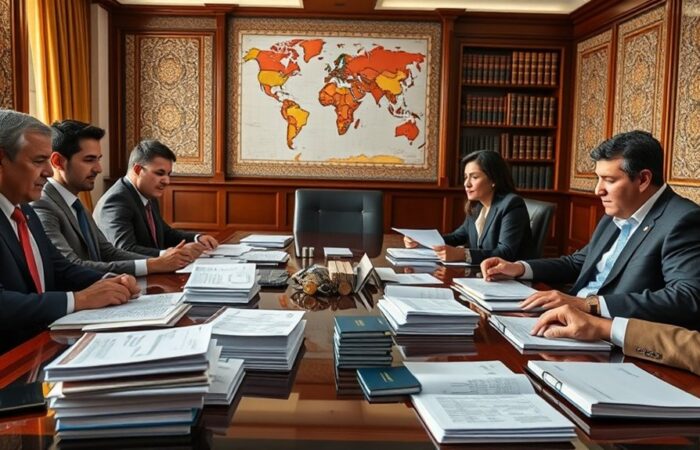You’re facing a ticking clock when it comes to police clearance certificates, and the validity windows aren’t doing you any favors. Each jurisdiction operates on its own timeline—Brazil’s Federal Police certificates expire differently than those from European nations, while apostille requirements add another layer of complexity. Vieira Braga Advogados has developed systematic approaches to prevent the nightmare scenario where your critical documentation expires just days before your immigration deadline.
Understanding Police Clearance Validity Periods Across Different Jurisdictions
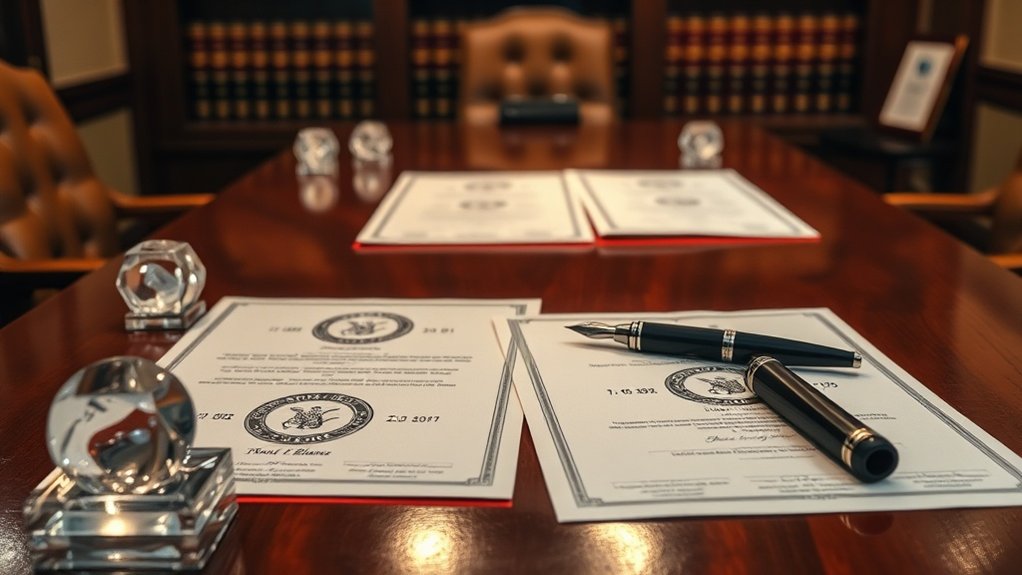
When do police clearances expire, and how does this vary by country? You’ll find that validity periods differ significantly across jurisdictions, creating complexity for international applications. Most countries establish specific timeframes ranging from three months to one year.
In the United States, FBI background checks don’t technically expire, but receiving agencies often accept documents only within 3-6 months of issuance. Canada’s RCMP clearances remain valid for three months for immigration purposes. Australia typically requires police checks issued within 12 months, while the UK accepts certificates up to three months old for most visa applications.
European countries vary considerably – Germany accepts clearances within six months, while Portugal often requires documents issued within three months. You’ll need to verify requirements with your destination country’s embassy or immigration authority, as these timeframes frequently change. Understanding these variations prevents application delays and ensures you’re obtaining clearances at optimal timing for your specific requirements. Given the complexity and frequent updates of immigration laws, specialized legal assistance becomes crucial for navigating document validity requirements and avoiding potential visa denials.
Brazilian Federal Police Certificate Expiration Requirements and Renewal Processes
Since Brazil operates under federal jurisdiction for criminal background verification, you’ll need to understand that Brazilian Federal Police certificates carry a standard six-month validity period from their issuance date. This timeline isn’t negotiable—Brazilian authorities strictly enforce these expiration dates for all legal proceedings, immigration applications, and employment verification purposes.
You can’t renew an expired certificate. Instead, you must request a completely new document through the Federal Police’s online portal or authorized service centers. The renewal process involves:
- Submitting fresh biometric data that could delay your urgent visa application by weeks
- Paying full processing fees again despite having recently obtained the same document
- Waiting 10-15 business days while your job opportunity or immigration deadline approaches
- Potentially traveling to Brazil if you’re abroad and need authenticated copies
Plan ahead strategically. Submit your certificate requests closer to your actual need dates to maximize their validity window. Negligence in managing these validity windows can lead to application denials and significant delays in your immigration process.
International Apostille Timing Considerations for Cross-Border Documentation
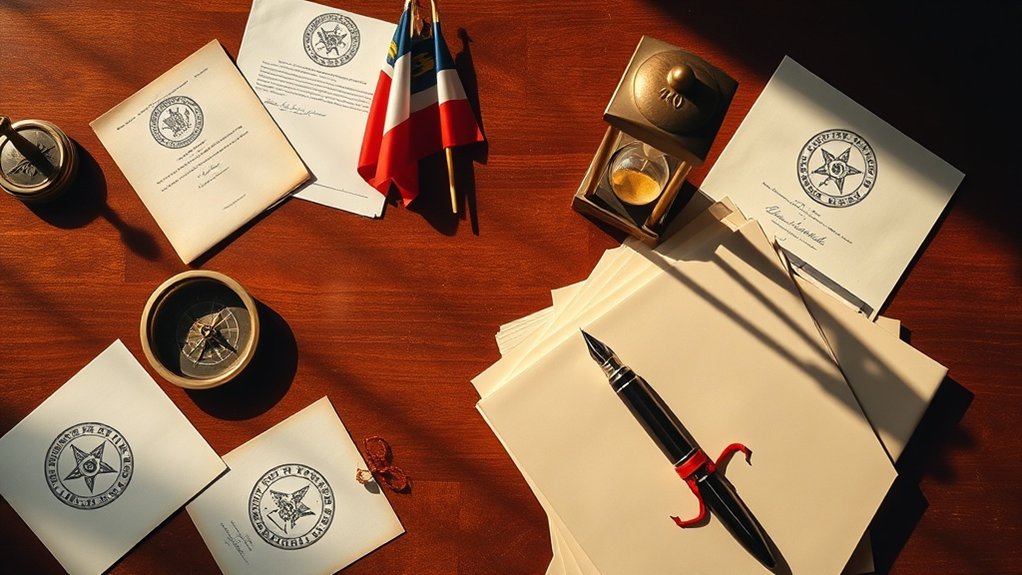
Beyond managing your Brazilian Federal Police certificate’s six-month window, you’ll face another timing challenge that catches most applicants off-guard: apostille processing delays that can derail your entire documentation timeline.
You’ll need to coordinate apostille timing across multiple jurisdictions, each with different processing windows. Standard apostille processing takes 5-15 business days, but expedited services can reduce this to 24-48 hours for additional fees.
| Country | Standard Processing | Expedited Option | Cost Difference |
|---|---|---|---|
| United States | 8-15 business days | 24-48 hours | $50-100 extra |
| Canada | 10-20 business days | 3-5 business days | $75-125 extra |
| United Kingdom | 7-10 business days | Same day | £30-50 extra |
| Australia | 10-15 business days | 2-3 business days | $80-120 extra |
| Germany | 5-10 business days | 1-2 business days | €40-70 extra |
You’ll want to request apostilles only after confirming your Brazilian certificate’s validity period aligns with your submission deadline. Working with a specialized immigration lawyer can help you navigate these complex timing requirements and ensure all documentation deadlines are met properly within the current regulatory framework.
Managing Multiple Jurisdiction Clearances With Misaligned Validity Windows
While apostille timing creates its own complications, you’ll discover that managing police clearances from multiple countries presents an even more complex puzzle when each jurisdiction operates on different validity windows.
You’re juggling documents that expire at different intervals—some valid for three months, others for six, and a few stretching to twelve months. This misalignment creates strategic nightmares when assembling comprehensive documentation packages.
Consider these emotional realities you’ll face:
- Panic attacks when realizing your oldest clearance expires just days before your application deadline
- Financial stress from repeatedly ordering expensive clearances to maintain current status
- Sleep deprivation caused by calculating and recalculating expiration dates across time zones
- Relationship strain when delays affect family members’ immigration or employment opportunities
You’ll need to reverse-engineer your timeline, identifying the shortest validity window first, then orchestrating all other clearances to align with that critical expiration date. Even minor documentation errors during this coordination process can result in rejected applications and force you to restart the entire timeline with fresh clearances.
Strategic Planning for Processing Delays and Application Deadline Conflicts
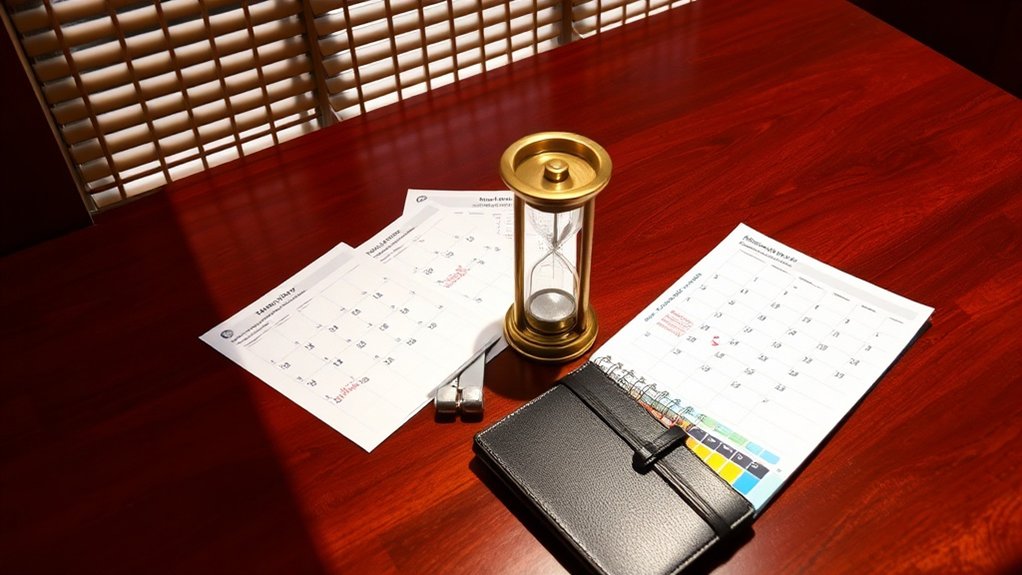
Even perfect timeline coordination becomes meaningless when processing delays collide with immovable application deadlines. You’ll need buffer strategies that account for worst-case scenarios while maintaining document validity.
Start your clearance applications 60-90 days before your target submission date, not when you think you’ll need them. This cushion absorbs unexpected delays from overwhelmed government offices or holiday closures that can stretch processing times beyond published estimates.
Create contingency plans for each jurisdiction’s potential delays. If you’re applying for multiple clearances, stagger your requests so the shortest-validity documents arrive last. You can’t control processing speed, but you can control timing.
Consider expedited processing options where available, even if costly. The expense of rush fees pales compared to missing critical deadlines or restarting entire application processes.
Monitor your applications actively through tracking systems and direct contact. Don’t assume silence means progress. Early identification of delays gives you options – whether requesting extensions, finding alternatives, or adjusting your timeline strategy.
Remember that sworn translations may be required for your criminal background checks, adding another layer of processing time that must be factored into your overall immigration timeline.
Emergency Extension Protocols When Immigration Policies Change Unexpectedly
When immigration policies shift overnight, your carefully planned timeline can crumble within hours, leaving valid police clearances suddenly insufficient for new requirements.
Emergency extension protocols become your lifeline when governments unexpectedly change validity periods or acceptance criteria. You’ll need immediate legal intervention to navigate these turbulent waters and protect your application status.
Critical emergency response steps include:
- Document the policy change timestamp – Your legal team needs exact timing to argue grandfathering rights for applications already in progress
- Request expedited government communications – Official clarifications often take weeks, but emergency petitions can accelerate responses
- File protective applications immediately – Submit under both old and new requirements to maintain your position in processing queues
- Mobilize consular advocacy networks – Diplomatic channels can provide temporary relief while permanent solutions develop
Quick action prevents months of delays and protects your immigration dreams from bureaucratic chaos beyond your control.
Seeking professional guidance ensures correct and strategic handling of each process stage when unexpected policy changes threaten to derail your immigration timeline.
Compliance Monitoring Systems for Continuous Documentation Status

Since police clearances expire without warning across multiple jurisdictions, you’ll need automated compliance monitoring systems that track every document’s status in real-time. These systems prevent devastating gaps that could derail your immigration timeline.
Your monitoring system should include digital calendars with multiple alerts, document scanning capabilities, and direct integration with issuing authorities’ databases. Set alerts at 90, 60, and 30 days before expiration to ensure adequate renewal time.
| Document Type | Expiration Risk | Consequence |
|---|---|---|
| FBI Background Check | 12-month validity | Visa denial |
| State Police Certificate | 6-month validity | Application rejection |
| International Apostille | Variable timeframes | Legal invalidity |
| Consular Authentication | 3-6 months typical | Processing delays |
| Court Records | Immediate expiry | Complete restart |
Implement cloud-based tracking systems that sync across devices and provide stakeholder access. Your legal team needs real-time visibility into documentation status to proactively address expiring certificates before they compromise your case. Professional immigration lawyers can integrate these monitoring systems with their case management protocols to ensure documentation remains current throughout the complex immigration process.
Risk Mitigation Strategies for Expired Certificate Prevention
Beyond real-time monitoring, you must establish layered prevention strategies that eliminate expiration risks before they materialize. Your legal status depends on proactive measures that create multiple safeguards against documentation lapses.
Implement these critical prevention protocols:
- 90-Day Alert System – Configure automated notifications when certificates reach 90 days before expiration, triggering immediate renewal processes
- Backup Documentation Protocol – Maintain overlapping validity periods by initiating renewals at 180-day marks, ensuring seamless transitions
- Emergency Fast-Track Procedures – Establish expedited processing relationships with issuing authorities for urgent renewal situations
- Legal Buffer Zones – Create 30-day safety margins between certificate expiration and critical deadline requirements
You can’t afford documentation gaps that compromise your legal standing. These strategies transform reactive scrambling into controlled, predictable processes. Your prevention framework should anticipate delays, bureaucratic complications, and unexpected circumstances. Vieira Braga Advogados ensures your documentation remains current through systematic risk elimination. Inadequate guidance during these critical validity windows can lead to visa denials and other serious legal consequences that jeopardize your immigration status.
Coordinating Renewal Schedules for Complex Multi-Country Legal Processes
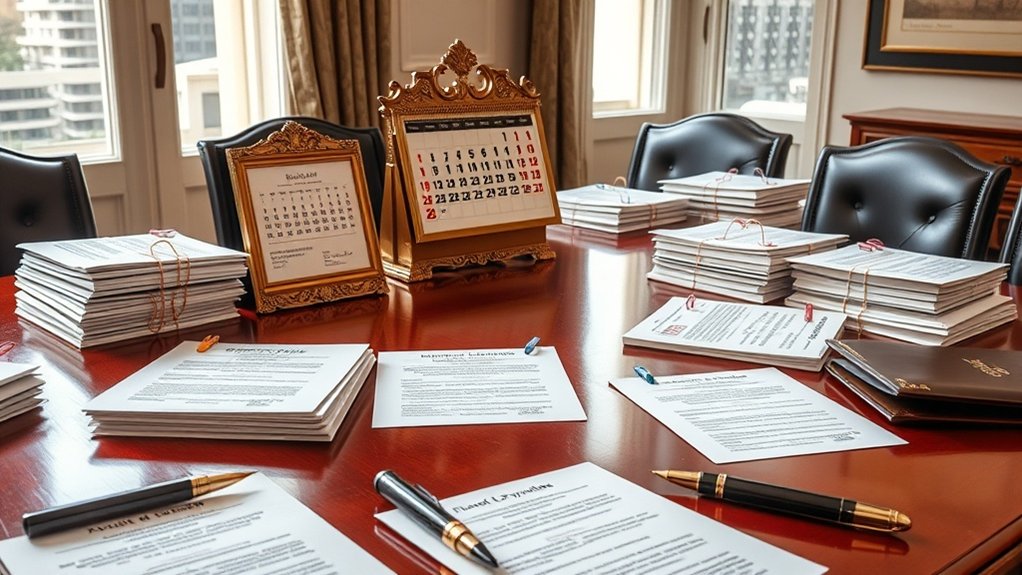
Whereas single-country documentation presents manageable timelines, multi-jurisdictional legal processes demand sophisticated coordination that synchronizes renewal schedules across different legal systems. You’ll need to map each country’s specific validity periods and processing times to create overlapping renewal windows that prevent gaps in coverage.
Start by identifying the shortest validity period among all required certificates, then work backward from your target submission date. You should stagger renewal applications strategically, accounting for varying processing speeds across jurisdictions. Some countries issue certificates within days, while others require weeks or months.
Create a master timeline that tracks expiration dates, renewal deadlines, and buffer periods for unexpected delays. You’ll want to initiate renewals when certificates reach 60-70% of their validity period, ensuring fresh documentation arrives before existing certificates expire.
Consider appointing local representatives in each jurisdiction to expedite processes and handle urgent renewals when timing becomes critical. Professional support from specialized firms ensures compliance with both Brazilian and international regulations while minimizing the risk of documentation gaps that could derail your immigration process.
Frequently Asked Questions
What is the validity of Indian police clearance certificate for Canada immigration?
The Indian Police Clearance Certificate (PCC) is generally valid for 6 to 12 months, but for Canada immigration, it must be recent at the time of submission, usually not older than 6 months.
What documents are required for police clearance certificate in India?
Applicants typically need a valid passport, proof of address, recent photographs, and a completed PCC application form, either submitted at the Passport Seva Kendra or Indian consulate abroad.
What Are Vieira Braga Advogados’ Consultation Fees for Police Clearance Services?
You’ll need to contact Vieira Braga Advogados directly to get their current consultation fees for police clearance services. They don’t publish standardized pricing since fees can vary based on your specific situation, the type of clearance you need, and the complexity of your case. You can reach out through their website or call their office to discuss your requirements and receive a detailed quote for their services.
Does the Firm Offer Weekend or Holiday Emergency Consultation Appointments?
You’ll need to contact Vieira Braga Advogados directly to confirm their emergency consultation availability during weekends and holidays. Most law firms don’t typically offer emergency services for police clearance matters since these aren’t urgent legal issues. However, they might accommodate special circumstances or have on-call arrangements. Check their website or call their office to inquire about after-hours consultation options for your specific police clearance needs.
Which Languages Can Vieira Braga Advogados Provide Translation Services In?
You’ll need to contact Vieira Braga Advogados directly to confirm which specific languages they can provide translation services in. Most international law firms typically offer translations in major languages like English, Spanish, French, and Portuguese, but the firm’s exact language capabilities aren’t specified in available information. They’ll provide you with a comprehensive list of their translation services and supported languages when you inquire.
How Can Clients Schedule Initial Consultations With the Law Firm?
You can schedule your initial consultation with Vieira Braga Advogados by contacting their office directly through phone or email. They’ll typically respond promptly to set up a meeting time that works for your schedule. You can also visit their website to find contact information and potentially use any online scheduling system they’ve implemented. Most law firms offer flexible scheduling options to accommodate clients’ busy schedules and time zone differences.
What Payment Methods Does Vieira Braga Advogados Accept for Their Services?
You can pay Vieira Braga Advogados through several convenient methods for their legal services. They’ll accept bank transfers, credit cards, and cash payments depending on your preference and the service type. You’ll need to discuss specific payment arrangements during your initial consultation, as they often customize payment plans based on case complexity and duration. They’ll provide detailed invoicing and can accommodate installment options for larger legal matters when appropriate.
Conclusion
You’ll navigate police clearance validity windows seamlessly when you partner with Vieira Braga Advogados. They’ll monitor your documentation timelines, coordinate apostille processes, and implement strategic renewal schedules that prevent expiration conflicts. You won’t face immigration delays or compliance issues because their proactive systems alert you to upcoming deadlines across multiple jurisdictions. You can trust their expert legal support to maintain your documentation status while managing complex cross-border requirements efficiently and effectively.

